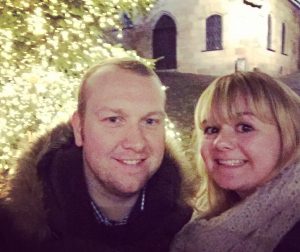What is your scientific background?
I’m originally from Manchester in the UK. I had a pretty conventional education, going straight from school to college and then uni. I did my undergrad degree at Durham University in Biomedical Sciences, and during my time there also spent a year working in a haematology lab in the NHS. I learned a lot while I was there, including that I really didn’t want to work in a pathology lab when I finished. Because of that, I started applying for PhDs in my final year, but couldn’t get past the interview stage as I didn’t have any research experience outside of my degree. I decided to do a Masters of Research at Liverpool Uni, in Advanced Biological Sciences, which I still think sounds far too fancy now. Once I had that under my belt, I was able to get a place on the Ph.D. program at the IGMM in Edinburgh. I started out working in a zebrafish lab, but after 9 months it wasn’t for me. Luckily I was able to switch to the project that I’m on now. I’ve just started my third and final year (gulp), working on resistance to targeted therapies in HER2-postive breast cancers. It’s a really big issue, as we have loads of great treatments but the majority of patients’ cancers become resistant to them and start progressing after a couple of years. As much as I enjoy #lablife, I don’t intend on staying in academia when I finish my Ph.D. My goal is to go into a career in medical writing, combining my love of science with that of writing.

What is a typical day like for you?
A typical day for me always starts with coffee. If I’ve got lab work to do, I like to try and get it started in the morning in case it takes longer than I’ve anticipated, which it often does. After hectic lab based mornings, most people in my lab tend to have lunch together. It’s a really good time to relax, and rant about what is and isn’t working, or to completely forget about work altogether for an hour. Afternoons can be really varied, depending on how busy my lab work is. Sometimes I’m back in the lab until I finish, other days I can be at my desk doing an analysis. I always try to leave between 5 and 6 to make sure I have time to get home, make a decent meal and relax. During term time, I’m often tutoring 3-4 weeknights, which means I HAVE to leave to get there on time. I’ve found it actually makes me more productive when I don’t have the ability to stay as late as I could do.
What are the hardest parts related to this work?
Quite often when I’m doing public engagement, people will tell me about their friends and relatives battles with cancer. It can be really hard to stand there and listen while feeling like your work is 10-20 years away from actually helping the people around you. Often there’s a happy ending and the person has beaten cancer, but sometimes they haven’t been so lucky. It really reminds me why the work I do is so important. It’s easy to forget when you spend your days looking at cells on plastic.

What (or who) motivated you in difficult times?
PhDs are full of turbulent times, so I’ve had my fair few of these so far. I’ve found so many places to get help. Friends and family are brilliant, as always, but it can really help if you can find somebody in a similar situation who has or is gone/going through the same thing. Apart from other students in my Institute, I’ve found Twitter and Instagram great places to connect with other students, and the science communities, especially on Instagram, are really supportive places.
Is there any scientific topic (outside of your field of research) that you think should have more scientific attention? Which one?
I think that asthma is hugely underfunded, considering it affects so many people. In the UK alone, somebody has an asthma attack every 10 seconds. Of these people, an average of 3 will die a day, and 2 of them are preventable. It’s crazy that we still don’t know what causes asthma when it’s such a prevalent issue.
Do you come from an academic family?
I would say no, but my Grandad was a lecturer in Maths at Salford Uni before it got its University status. I’ve got one uncle that went to Cambridge, but I’m the only one out of my family (that I know of) that’s gone on to work in science and academia past undergrad level.

How does your family regard your career choice?
My family is super supportive, and as long as I’m happy with whatever it is that I’m doing, then they’re happy too. I couldn’t wish for prouder parents and grandparents.
Besides your scientific interests, what are your personal interests?
I love travelling, just like most people, and I try to save up as much as I can to go away for weekend breaks here and there. when I’m at home, I’m either planning my next trip, baking or attempting to sew. Baking is definitely the easier of the two, I guess that’s because it’s sort of like science, you just need to follow the methods. I commend anybody who can sew really well. It takes me a whole weekend to even make a simple dress or skirt, even then I have wonky hemlines that I wear with pride.
If you had the option to give advice to a younger version of yourself, what would that be?
If people around you are dragging you down, it’s more than OK to let them go. Focus on yourself, and if you really mean that much to them, they’ll appreciate that and not get in your way.
You can visit Natasha’s blog, follow her on Twitter and Instagram.




